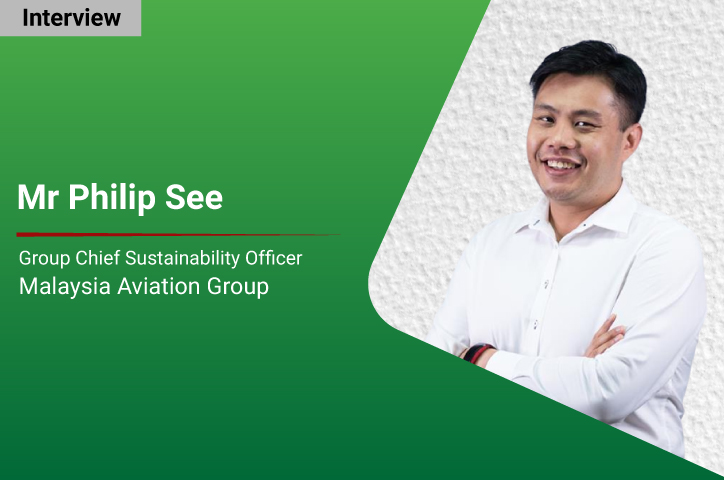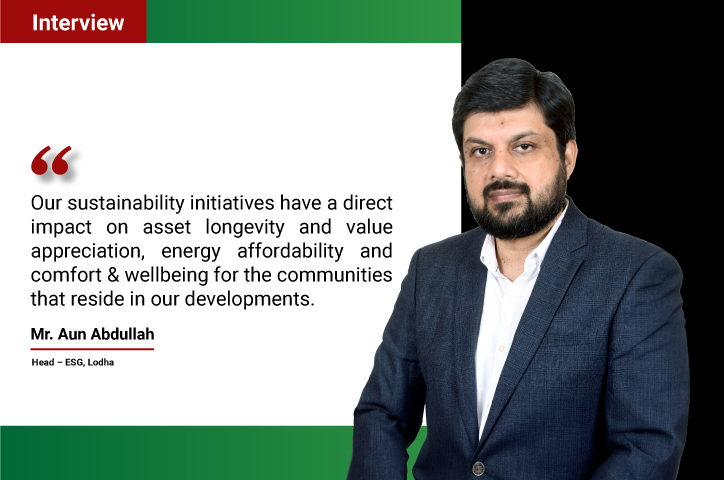Air travel produces about 3% of global carbon dioxide emissions, and it is one of the fastest-growing sources of greenhouse gases, according to the International Council on Clean Transportation (ICCT). Besides this, there are multiple allied activities and services which also cause environmental concerns.
To mitigate the sustainability risks caused by the industry, Airlines and many airports have embraced sustainability initiatives, such as improving building airport infrastructure (green spaces, use of natural light, and renewable energy), widely dispersed recycling bins, and automated and smart building technologies.
Malaysia Aviation Group (MAG) is also focusing on four key pathways towards net-zero emissions by 2050: aircraft efficiency, technological enhancements to aircraft, Sustainable Aviation Fuels (SAF), and carbon offsets. The group operates Malaysia Airlines which is the national carrier of Malaysia, flying to over 1100 destinations across 180 countries across Asia, Australia, Europe, and the Middle East. In India, it operates from 5 destinations- Delhi, Bengaluru, Chennai, Hyderabad and Mumbai.
In this interview, Mr. Philip See, Group Chief Sustainability Officer of Malaysia Aviation Group talks about MAG’s sustainability agenda, it’s sustainability journey so far and environmental sustainability increasingly becoming integral part of aviation sector’s growth story.
Mr See also shares his insights on the feasibility of corporations adopting sustainability goals in an ever-changing ESG landscape and challenges especially when it comes to striking a balance between sustainability goals and maintaining market competitiveness.
Scroll down to read the full interview…
Q: Over the last decade, efforts towards the reduction of carbon emissions and net-zero targets have emerged as the key discussion areas among corporations. What is Malaysia Aviation Group's stand on that?
A: One of our top priorities is to operate sustainably – encompassing environmental, social, safety, governance, and economic factors, as we take quantifiable steps in promoting socio-economic development and achieving net-zero carbon emissions by 2050. We believe this would not be achievable without whole-of-government, industry and societal intervention. Thus, we are delighted with the recent historic agreement where state members of the International Civil Aviation Organization (ICAO) adopted a long-term global aspirational goal (LTAG) of net-zero carbon emissions by 2050. The LTAG provides a more inclusive and holistic way of addressing the aviation decarbonisation efforts via multiple measures, including accelerated adoption of new and aircraft technologies, streamlined flight operations, and increased production and deployment of sustainable aviation fuels (SAF).
Our sustainability journey, guided by the MAG (Malaysia Aviation Group) Sustainability Blueprint launched in 2021, has led us towards taking practical steps to minimise environmental impacts within our business operations. This includes bio-composting food waste from flights, enhancing fuel efficiency measures, repurposing scrapped aircraft parts into new products, and collaborating with local homegrown designers to upcycle aircraft materials into bespoke designer bags and shoes.
Q: As one of the key Aviation industry stakeholders, what are your thoughts on sustainable development of the sector, especially in the post-COVID era when the market is in revival mode and industry dynamics are evolving fast?
A: The past two years have raised critical awareness on sustainability dimension of economic development. Across the globe, policymakers, development institutions and corporates are calling for a stronger emphasis on environmental sustainability. The airline industry, too, has demonstrated a real commitment to environmental sustainability through various tangible initiatives related to new aircraft technologies, enhanced operations and sustainable fuels.
Airlines and many airports have embraced sustainability initiatives, such as improving building airport infrastructure (green spaces, use of natural light, and renewable energy), widely dispersed recycling bins, and automated and smart building technologies. Airports continue to exhibit interest in IT that encourages energy conservation, environmentally friendly printing methods, and end-of-life recycling of IT equipment.
In my opinion, sustainability is an ongoing process of continuous improvement. As we look forward and seek to create a brighter future for the national aviation services group, the industry needs to be conscious and work towards creating a future that also elevates and protects the communities we are present in. In the long run, our sustainability initiatives will drive us to be a more responsible, efficient and effective organisation, with the character and mindset to be environmentally responsible, the leadership to empower and develop our workforce expertise, the responsibility to spearhead safety leadership, the experience to go above and beyond compliance, and the ingenuity to maintain and grow profitability and resilience.
Q: What are the key focus areas of Malaysia Aviation Group's sustainability agenda?
A: As a Group, MAG will focus on four key pathways towards net-zero emissions by 2050: aircraft efficiency, technological enhancements to aircraft, Sustainable Aviation Fuels (SAF), and carbon offsets. We just completed our Carbon Accounting project to track the Group’s GHG emissions and assist in the development of detailed decarbonisation strategy and mitigation plan; installation of solar panels; waste management programme to contribute to the circular economy, and review of rainwater harvesting system within selected MAG building.
For us, Sustainability is also beyond just a mere net-zero. It is also about levelling up, increasing women participation in technical roles and also reducing income inequality. We have signed our commitment to IATA’s 25by2025 initiative to strengthen and improve female representation within our organisation and the wider aviation industry.
Q: What kind of interventions have you made to achieve your sustainable goals and what has been the result so far?
A: Some of the initiatives undertaken by Malaysia Airlines include waste management, where we are embarking on a waste circularity framework. MAG has set a target to achieve a recycling rate of 20-30 per cent by 2025 and 50 per cent by 2030 and beyond. In addition, the Group has set a goal for 50 per cent reduction of in-flight single use plastics by 2025.
On ground, the airline has put in place a range of renewable energy solutions since 2014 and has offset approximately 11,976 tonnes of CO2 since the installation of solar panels at its MASkargo complex. We have also pioneered the use of SAF on our flights, conducting the country’s first cargo and passenger flights using SAF.
Currently, we are also working on providing voluntarily offsetting for our passengers and exploring carbon markets to comply with Carbon Offsetting and Reduction Scheme for International Aviation (CORSIA) regulatory requirements that will come mandatory by 2027.
We also recently published first MAG Sustainability Report for the year 2020 and 2021, detailing the Group’s overall sustainability goals, achievements and prioritised matters within the key sustainability areas, including Environment, Social, Governance and Safety. You may read the report here: bit.ly/magsustainability
Q: How do you plan to make your customers part of your sustainability journey?
A: Tackling emissions from every aspect is a key priority for us. For our passengers, we have kick started the passenger voluntary offset project which will give the option to our passengers to offset their emissions in their travel. This is part of the initiative that we will be rolling out in 2023. These initiatives are crucial as we are making our customers to be part of our sustainability journey and for them to participate in green travelling as responsible travellers.
Besides giving option for passengers, the other key strategy is usage of SAF. SAF recognised globally as the most feasible option to significantly reduce aviation emissions in the near term. It is a key component of our strategy to deliver a more sustainable travel experience for our customers and the environment.
As a pioneer in using SAF in Malaysian aviation, we have conducted passenger flights powered by SAF on domestic and international routes. This includes the first passenger flight from Kuala Lumpur to Singapore operated by Malaysia Airlines, as well as Firefly’s (sister company under MAG) first domestic passenger flight from Subang to Penang, and the first international flight from Seletar, Singapore to Subang, all powered by SAF. This is part of our overarching commitment to promoting socio-economic development and achieving its global commitment to net-zero carbon emissions by 2050. MAG will be working towards building deeper and longer-term partnerships to ensure continuous SAF-powered flights in the future.
Q: What is your opinion on the feasibility of corporations adopting sustainability goals in an ever-changing ESG landscape? What are the challenges especially when it comes to striking a balance between sustainability goals and maintaining market competitiveness?
A: Companies have no choice but to adapt to the changing of environmental responsibilities since change is inevitable. There are many barriers for the aviation industry to achieve net zero emissions and it requires constant step change, instead of a gradual change. Where I stand now and see, it is challenging, but if we have a conversation in three or four years, it will be a very different tone, simply because of the way technology is evolving so fast.
Q: As per your extensive knowledge and experience of the aviation industry, how do you think aviation industry players can ensure the smooth execution of their ESG goals, without undermining its shareholders' value creation and company's returns?
A: I believe that SAF is a key lever to achieving long-term net zero ambitions. However, it requires an all-in holistic approach with further R&D and huge investments to enhance the technology, as well as a shift in the regulatory environment to ensure wider and deeper adoption of SAF in the industry.
Generally, industry players are committed to achieving Sustainable Development Goal 13: Climate Action, in accordance with the Paris Agreement towards reducing carbon emissions by 45% by 2030
I believe industry players are working at their level best to deliver socially responsible and environmentally focused effort, as one of its key priorities in sustaining the aviation industry and accelerating the global call for climate action towards achieving net zero emissions by 2050.
These efforts are in line with global regulations and comply with the CORSIA requirements set by the ICAO.
Q: What are your suggestions towards making sustainability targets, measurement or adoption easier for corporates from an execution perspective?
A: Most corporations are aware of their responsibilities. I would suggest practicing agility and being resilient to my peers. Setting long-term objectives that are achievable, quantifiable, and realistic would make things easier.
One of the important elements to inculcating sustainability behaviour in daily business practices is by providing adequate knowledge to the key stakeholders, including staff, board members and suppliers. Awareness of sustainability related matters is crucial. This is required to plan effective solutions and measure the business progress along the way in achieving net zero targets by 2050.
Q: What is your message to your peers on sustainability becoming an integral part of their policy and work culture?
A: It is important to bring awareness and bring to light the importance of sustainability to our customers, passengers, and also to key stakeholders. However, consumers are already becoming more climate-conscious, particularly the younger generation. They are much more aware of the impact and ask for information on carbon emissions and how to offset them to make their trips more sustainable.
Therefore, it is now even more crucial for companies to reduce their impact on the environment and create environmentally conscious workplaces.














.jpg)



